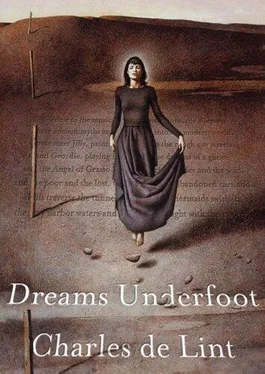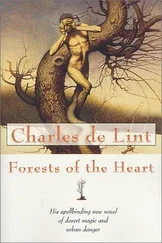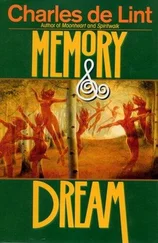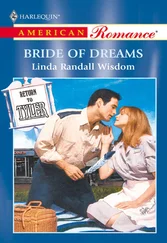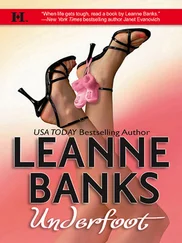“Maybe I did step out of a tree one day,” Meran said.
Jilly could feel her mouth forming a surprised “0,” but then Meran laughed again.
“But probably I didn’t,” she said. Before Jilly could ask her about that “probably,” Meran went on:
“We’ll need some sort of protection against them.”
Jilly made her mind shift gears, from Meran’s origins to the problem at hand.
“Like holy water or a cross?” she asked.
Her head filled with the plots of a hundred bad horror films, each of them clamoring for attention.
“No,” Meran said. “Religious artifacts and trappings require faith—a belief in their potency that the skookin undoubtedly don’t have. The only thing I know for certain that they can’t abide is the truth.”
“The truth?”
Meran nodded. “Tell them the truth—even it’s only historical facts and trivia—and they’ll shun you as though you were carrying a plague.”
“But what about after?” Jilly said. “After we’ve delivered the drum and they come looking for me?
Do I have to walk around carrying a cassette machine spouting dates and facts for the rest of my life?”
“I hope not.”
“But—”
“Patience,” Meran replied. “Let me think about it for awhile.” Jilly sighed. She regarded her companion curiously as Meran took a sip of her coffee.
“You really believe in this stuff, don’t you?” she said finally. “Don’t you?”
Jilly had to think about that for a moment.
“Last night I was scared,” she said, “and I’m returning the drum because I’d rather be safe than sorry, but I’m still not sure.”
Meran nodded understandingly, but, “Your coffee’s getting cold,” was all she had to say.
Meran let Jilly stay with her that night in the rambling old house where she and Cerin lived. Straddling the border between Lower Crowsea and Chinatown, it was a tall, gabled building surrounded by giant oak trees. There was a rounded tower in the front to the right of a long screenenclosed porch, stables around the back, and a garden along the west side of the house that seemed to have been plucked straight from a postcard of the English countryside.
Jilly loved this area. The Kelledys’ house was the easternmost of the stately estates that stood, row on row, along McKennitt Street, between Lee and Yoors. Whenever Jilly walked along this part of McKennitt, late at night when the streetcars were tucked away in their downtown station and there was next to no other traffic, she found it easy to imagine that the years had wound back to a bygone age when time moved at a different pace, when Newford’s streets were cobblestoned and the vehicles that traversed them were horsedrawn, rather than horsepowered.
“You’ll wear a hole in the glass if you keep staring through it so intently.”
Jilly started. She turned long enough to acknowledge her hostess’s presence, then her gaze was dragged back to the window, to the shadows cast by the oaks as twilight stretched them across the lawn, to the long low wall that bordered the lawn, to the street beyond.
Still no skookin. Did that mean they didn’t exist, or that they hadn’t come out yet? Or maybe they just hadn’t tracked her here to the Kelledys’ house.
She started again as Meran laid a hand on her shoulder and gently turned her from the window.
“Who knows what you’ll call to us, staring so,” Meran said.
Her voice held the same light tone as it had when she’d made her earlier comment, but this time a certain sense of caution lay behind the words.
“If they come, I want to see them,” Jilly said.
Meran nodded. “I understand. But remember this: the night’s a magical time. The moon rules her hours, not the sun.”
“What does that mean?”
“The moon likes secrets,” Meran said. “And secret things. She lets mysteries bleed into her shadows and leaves us to ask whether they originated from otherworlds, or from our own imaginations.”
“You’re beginning to sound like Bramley,” Jilly said. “Or Christy.”
“Remember your Shakespeare,” Meran said. “‘This fellow’s wise enough to play the fool.’ Did you ever think that perhaps their studied eccentricity protects them from sharper ridicule?”
“You mean all those things Christy writes about are true?”
“ I didn’t say that.”
Jilly shook her head. “No. But you’re talking in riddles just like a wizard out of some fairy tale. I never understood why they couldn’t talk plainly.”
“That’s because some things can only be approached from the side. Secretively. Peripherally.”
Whatever Jilly was about to say next, died stillborn. She pointed out the window to where the lawn was almost swallowed by shadows.
“Do ...” She swallowed thickly, then tried again. “Do you see them?”
They were out there, flitting between the wall that bordered the Kelledys’ property and those tall oaks that stood closer to the house. Shadow shapes. Fat, pumpkinbodied and twiglimbed. There were more of them than there’d been last night. And they were bolder. Creeping right up towards the house.
Threats burning in their candleflicker eyes. Wide mouths open in jacko’-lantern grins, revealing rows of pointed teeth.
One came sidling right up to the window, its face monstrous at such close proximity. Jilly couldn’t move, couldn’t even breathe. She remembered what Meran had said earlier they can’t abide the truth
—but she couldn’t frame a sentence, never mind a word, and her mind was filled with only a wild unreasoning panic. The creature reached out a hand towards the glass, clawed fingers extended. Jilly could feel a scream building up, deep inside her. In a moment that hand would come crashing through the window, shattering glass, clawing at her throat. And she couldn’t move. All she could do was stare, stare as the claws reached for the glass, stare as it drew back to
Something fell between the creature and the house—a swooping, shapeless thing. The creature danced back, saw that it was only the bough of one of the oak trees and was about to begin its approach once more, but the cries of its companions distracted it. Not until it turned its horrible gaze from her, did Jilly feel able to lift her own head.
She stared at the oaks. A sudden wind had sprung up, lashing the boughs about so that the tall trees appeared to be giants, flailing about their manylimbed arms like monstrous, agitated octopi. The creatures in the yard scattered and in moments they were gone—each and every one of them. The wind died down; the animated giants became just oak trees once more.
Jilly turned slowly from the window to find Meran pressed close beside her.
“Ugly, furtive and sullen,” Meran said. “Perhaps Christy wasn’t so far off in naming them.”
“They ... they’re real, aren’t they?” Jilly asked in a small voice.
Meran nodded. “And not at all like the bodachs of my homeland. Bodachs are mischievous and prone to trouble, but not like this. Those creatures were weaned on malevolence.”
Jilly leaned weakly against the windowsill.
“What are we going to do?” she asked.
She scratched at her palm—the itch was worse than ever. Meran caught her hand, pulled it away.
There was an unhappy look in her eyes when she lifted her gaze from the mark on Jilly’s palm.
“Where did you get that?” she asked.
Jilly looked down at her palm. The scab was gone, but the skin was all dark around the puncture wound now—an ugly black discoloration that was twice the size of the original scab.
“I scratched myself,” she said. “Down in Old City.”
Meran shook her head. “No,” she said. “They’ve marked you.”
Читать дальше
